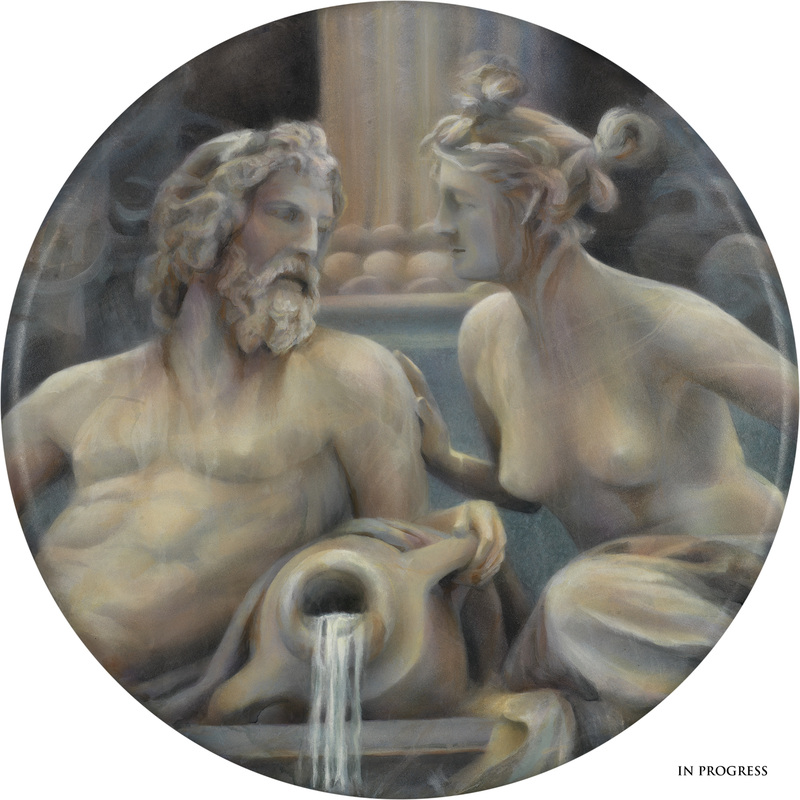Zeus & Hera
|
A Heavenly Marriage?
The Classical Mythology of Hera and Zeus After Leto, Zeus found a lover who put him in seventh heaven. For this lover, his seventh, was the one he chose to marry: his sister Hera. When he began courting her—in secret, so that his mother would not find out—Hera, who no doubt knew that Zeus had already had six different lovers, spurned his romantic overtures. Zeus realized he needed another approach. So he appeared to her in the guise of a bedraggled, rain-soaked cuckoo. Hera saw the poor bird and kindly brought him into the shelter of her bosom to warm and dry him. Zeus immediately returned to his true form and—true to form, indeed—ravished her. He thus shamed Hera into marrying him. Hera regularly bathed in the spring of Canathus near Argos—and in doing so restored and renewed her virginity. The first wedding of Olympians was no small occasion. All the gods and goddesses attended, bringing with them marvelous gifts. Gaia presented her granddaughter, Hera, with a wondrous tree. Hera planted this tree, richly hung with Golden Apples, in her garden under the care of the Hesperides, nymphs who were daughters of the Night (Nyx). Hera and Zeus had a glorious wedding night—one that lasted 300 years. Zeus and Hera had three children together: Ares, the god of war; Hebe, a perpetually youthful beauty; and Eileithyia, the goddess of childbirth. lthough Hera was a goddess of both marriage and childbirth herself, she never had a happy or peaceful marriage. Zeus continued to have love affairs with goddesses, nymphs, and mortals long after he married Hera, much to her chagrin. |
A full accounting of his conquests would humble Don Juan. The list of trysts included, among many, many others:
Lo, the daughter of the river god Inachus, was seduced or raped by Zeus. When Hera came looking for her husband, Zeus transformed Io into a cow either to protect her from Hera's wrath or to hide his own shame. Not fooled a bit, Hera sent a gadfly that repeatedly stung Io, driving her all the way through Asia Minor and into Africa. Only then did Zeus, finding Io on the banks of the Nile River, change her back into a woman. Needless to say, this parade of paramours caused quite a bit of marital tension between the King and Queen of Heaven. Hera was understandably jealous of all of her husband's infidelities. The goddess had a violent temper, and Zeus roused her fury more than once with his incessant seductions.
The scorned goddess poured most of her energy into pursuing, punishing, and persecuting her husband's mistresses and bastard children:
Teiresias was uniquely qualified to mediate the dispute between Zeus and Hera, for only he had tasted the pleasures of life as both a man and a woman. As a young man, he had killed a female snake in the act of coupling, and was immediately transformed into a woman. After seven years of this life, he killed a male snake in the act of mating, and he changed back to a man on the spot.
Jealousy was not the only emotion that could rouse Hera's anger. The goddess was also extremely competitive about her beauty. When Side, the first wife of the great hunter Orion, boasted that she was more beautiful than Hera, the goddess dispatched her to Hades. And when Paris of Troy chose Aphrodite as the fairest of the goddesses, Hera naturally took the side of the Greeks in the Trojan War that followed (see All's Not Fair in Love and War: The Fall of Troy). Zeus forbade divine interference in this conflict. Yet despite this prohibition, Hera once seduced her husband, distracting his attention so that Poseidon could incite the Greeks to attack the Trojans.
Zeus and Hera once argued about whether men or women derived greater pleasure from the act of making love. Each insisted that the other's gender reaped the greater share of pleasure. The great seer Teiresias, called in to decide the matter, insisted that a woman's pleasure was nine times that of man. Infuriated, Hera immediately blinded the seer.
_________________________________________________________________________________________________________________________________
Excerpted from The Complete Idiot's Guide to Classical Mythology © 2004 by Kevin Osborn and Dana L. Burgess, Ph.D..
All rights reserved including the right of reproduction in whole or in part in any form.
To order this book direct from the publisher, visit the Penguin USA website or call 1-800-253-6476.
You can also purchase this book at Amazon.com and Barnes & Noble.
Read more:
Classical Mythology: A Heavenly Marriage? Hera and Zeus | Infoplease.com http://www.infoplease.com/cig/mythology/heavenly-marriage-hera-zeus.html#ixzz2kNP9toGA
- Maia, a Pleiad (daughter of Atlas), by whom he fathered Hermes (see The A Team: Olympians All)
- Electra, another Pleiad, with whom he conceived Dardanus
- Taygete, a third Pleiad, with whom he conceived Lacedaemon
- Semele, a mortal, who gave birth to Dionysus
- Alcmene, another mortal, who became the mother of Heracles
- Dana, the mother of Perseus
- Leda, by whom he fathered Helen and Polydeuces
Lo, the daughter of the river god Inachus, was seduced or raped by Zeus. When Hera came looking for her husband, Zeus transformed Io into a cow either to protect her from Hera's wrath or to hide his own shame. Not fooled a bit, Hera sent a gadfly that repeatedly stung Io, driving her all the way through Asia Minor and into Africa. Only then did Zeus, finding Io on the banks of the Nile River, change her back into a woman. Needless to say, this parade of paramours caused quite a bit of marital tension between the King and Queen of Heaven. Hera was understandably jealous of all of her husband's infidelities. The goddess had a violent temper, and Zeus roused her fury more than once with his incessant seductions.
The scorned goddess poured most of her energy into pursuing, punishing, and persecuting her husband's mistresses and bastard children:
- She tried to prevent Leto from giving birth even though that affair had come before his marriage.
- She sent a relentless gadfly to torment the mortal Io after Zeus had changed her into a cow.
- She provoked Artemis into shooting and killing Callisto, whom Zeus had transformed into a bear.
- She killed nearly all the inhabitants of the island named after Aegina. (Zeus later repopulated the island by transforming ants into people who became the subjects of his son by Aegina: Aeacus, the first king of the island that bore his mother's name.
- She goaded Semele into making a request to Zeus that ultimately destroyed her.
- She relentlessly persecuted Zeus's mortal son, Heracles, who rose to immortal status in spite of her.
Teiresias was uniquely qualified to mediate the dispute between Zeus and Hera, for only he had tasted the pleasures of life as both a man and a woman. As a young man, he had killed a female snake in the act of coupling, and was immediately transformed into a woman. After seven years of this life, he killed a male snake in the act of mating, and he changed back to a man on the spot.
Jealousy was not the only emotion that could rouse Hera's anger. The goddess was also extremely competitive about her beauty. When Side, the first wife of the great hunter Orion, boasted that she was more beautiful than Hera, the goddess dispatched her to Hades. And when Paris of Troy chose Aphrodite as the fairest of the goddesses, Hera naturally took the side of the Greeks in the Trojan War that followed (see All's Not Fair in Love and War: The Fall of Troy). Zeus forbade divine interference in this conflict. Yet despite this prohibition, Hera once seduced her husband, distracting his attention so that Poseidon could incite the Greeks to attack the Trojans.
Zeus and Hera once argued about whether men or women derived greater pleasure from the act of making love. Each insisted that the other's gender reaped the greater share of pleasure. The great seer Teiresias, called in to decide the matter, insisted that a woman's pleasure was nine times that of man. Infuriated, Hera immediately blinded the seer.
_________________________________________________________________________________________________________________________________
Excerpted from The Complete Idiot's Guide to Classical Mythology © 2004 by Kevin Osborn and Dana L. Burgess, Ph.D..
All rights reserved including the right of reproduction in whole or in part in any form.
To order this book direct from the publisher, visit the Penguin USA website or call 1-800-253-6476.
You can also purchase this book at Amazon.com and Barnes & Noble.
Read more:
Classical Mythology: A Heavenly Marriage? Hera and Zeus | Infoplease.com http://www.infoplease.com/cig/mythology/heavenly-marriage-hera-zeus.html#ixzz2kNP9toGA


